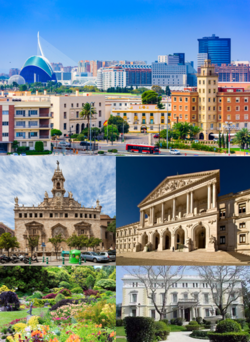Cienflores: Difference between revisions
No edit summary |
No edit summary |
||
| Line 14: | Line 14: | ||
|established_date = March 19, 1965 | |established_date = March 19, 1965 | ||
|leader_title = [[President of Auratia#Mayor of Cienflores|Mayor of Cienflores]] | |leader_title = [[President of Auratia#Mayor of Cienflores|Mayor of Cienflores]] | ||
|leader_name = [[Enrique Santos | |leader_name = [[Enrique Santos Domínguez]] | ||
|area_total_km2 = 701.6 | |area_total_km2 = 701.6 | ||
|area_total_sq_mi = | |area_total_sq_mi = | ||
Latest revision as of 02:30, 26 May 2020
Cienflores | |
|---|---|
| Ciudad de Cienflores City of Cienflores | |
 From the top, clockwise: Cienflores skyline; César Palace, the seat of the Auratian Parliament; Presidential Estate; Garden of the Great Peace; Santa Maria de La Paz Church. | |
| Nicknames: La Vieja Nueva | |
| Motto(s): "Pax et Pausa" (Solarian: Peace and Pause) | |
| Country | |
| Founded | March 19, 1965 |
| Government | |
| • Mayor of Cienflores | Enrique Santos Domínguez |
| Area | |
| • Capital city and federal district | 701.6 km2 (270.9 sq mi) |
| Elevation | 1,172 m (3,845 ft) |
| Population (2016) | |
| • Density | 289.26/km2 (749.2/sq mi) |
| • Urban | 202,951 |
| Demonym | Cienfloreros |
| Postal code | 44600-000 |
| Area code | +71 33 |
| Website | cienflores.au |
Cienflores is the administrative capital city of Auratia. Located near the nation's geographic centre, Cienflores is the seat of the Auratian Senate, as well as most executive, legislative, and ombudsman offices. Cienflores contrasts with Puerto del Rey, the nation's ceremonial capital and the seat of the Supreme Court.
Cienflores is a planned city, whose construction began in 1960 and ended on March 19, 1965. The city was the brainchild of Premier Silvio Caballero, who saw it through to its completion. The change in capital cities, which was very controversial at the time, was prompted by a desire to preserve the ancient architecture of the Old Quarter of Puerto del Rey, the previous seat of the government, and to bring the base of power away from city elite and closer to farming communities. The project ended a culmination of efforts to distance the seat of government from spheres of military influence after the September Clan military junta takeover during the Great War and ensure the autonomy of the federal government.
Despite being one of Auratia's newest cities, Cienflores was designed to reflect renaissance and classical architectural styles.
Cienflores is a federal territory and thus is not given any of the rights that states in the Commonwealth enjoy. The president of Auratia is ex officio mayor of Cienflores, and he appoints administrators to manage day-to-day city affairs. Notably, the city's population is capped at 230,000 to keep it low and manageable.
Etymology
Cienflores comes from Auratian cien flores, "hundred flowers". The name draws upon the city's emphasis on natural beauty and the prevalence of its over 15 botanical gardens, most notably the Garden of the Great Peace. The city's layout was intentionally designed in the pattern of a rose. These design choices, as well as the city's name, draw on a much-cited quotation from Auratian Premier Héctor Alvear: Que cien flores florezcan al unísono! ("May one hundred flowers flourish as one!").
